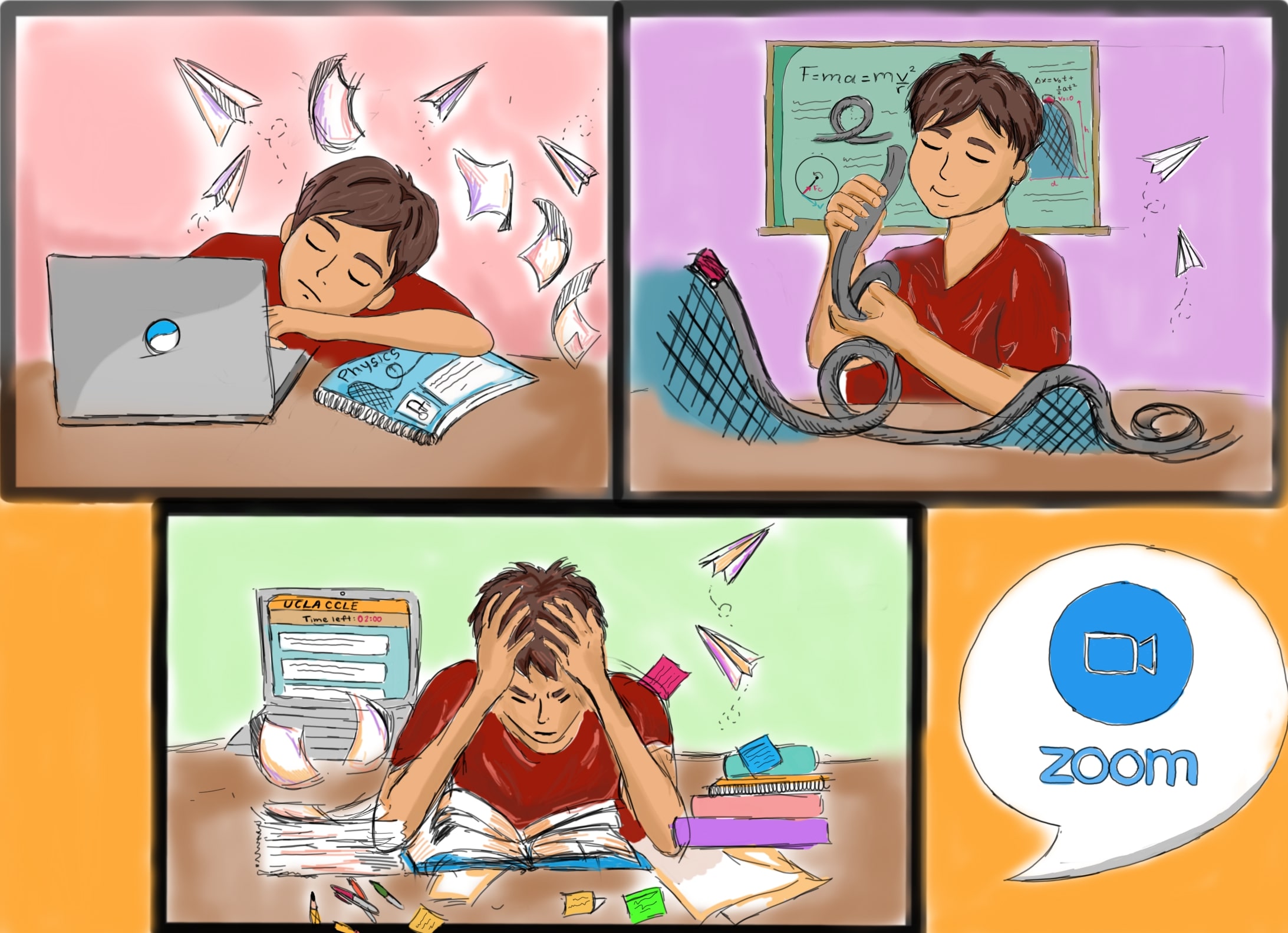Professors should utilize creative testing alternatives in shift to online learning

(Vaibhavi Patankar/Daily Bruin)
By Leslie Landis
April 16, 2020 6:20 p.m.
Taking a class remotely via Zoom is not the same as taking a class on UCLA campus.
But some professors are pretending like nothing has changed.
UCLA announced it would be moving classes online March 10 and soon moved classes online only for the entirety of spring quarter. Despite the major change, standardized exams continue to play a heavy role in determining students’ final grades.
But moving forward, this new form of teaching means a new form of testing is required.
In order to make the most out of an unfortunate situation, professors should replace final exams with research papers or creative online projects that will allow students to apply what they have learned in an engaging manner. This will not only keep students committed to the course throughout the entire quarter, no matter where that student is located, but it will also eliminate the risks of cheating all together, providing a more standardized evaluation of students’ capabilities.
The problem with administering tests online is that students will rely on excessive note taking without fully taking the time to synthesize the new material. This has been an issue in the education system even before the outbreak of COVID-19: the reliance on memorization over analysis.
In addition, even if professors rely on the academic honor code or use popular software such as Respondus to prevent cheating on exams, students will almost certainly find a work around to this. And with students now scattered around the world self-isolating, coordinating a time to take the exams that would work with 10-plus time zones is nearly impossible.
With three weeks of notice, Sarah Beckmann, an assistant professor in the classics department, said she changed the syllabus of her popular general education course, Classics 51B: “Art and Archaeology of Ancient Rome,” from a final exam to an open-ended research assignment where students can pick any digital medium they want on a topic they learned during the quarter.
“The research project allows students to do something creative with what they learned,” Beckmann said. “Ideally, other people in the class can access it and engage in that info in a fun, online platform.”
Beckmann said she considered keeping an online exam, but found that an alternative project gives students a chance to take charge of their own learning and reflect on the course instead of simply giving mechanical responses.
There are a variety of benefits to replacing traditional exams with creative projects. Projects allow students to expand upon their skills such as problem solving, research gathering and information synthesizing.
And when students are worrying about the safety of themselves and their loved ones, regurgitating facts that can be found with two clicks on Google is the last thing on their mind.
Michael Wong, a second-year electrical engineering international student staying on campus, said he’s had difficulty finding the motivation to be on top of his subjects and maintain a weekly schedule without classes, clubs and friends.
“I have been messing around with different forms of artistic expression such as music production, video editing and drawing,” Wong said. “If we were given the chance to do alternative projects (in all classes), such as the one in Classics 51B, I would have more motivation to do them and do them well.”
But creative final projects aren’t just limited to humanities courses.
Kyle Cavanaugh, an assistant professor in the geography department, is currently teaching a physical science general education class, Geography 5: “People and Earth’s Ecosystems,” and replaced a traditional final exam with a final research paper.
“A research paper goes beyond memorization and develops higher level skills,” Cavanaugh said. “It prepares students for the kinds of products they’d produce in a job setting.”
With summer session A officially moved online and the strong possibility that C session or even fall quarter will follow suit, professors must set a precedent of nontraditional testing early on.
It’s understandable why professors would want to change their syllabuses as little as possible; in times of chaos and uncertainty, some professors and students want stability in their class structures.
One could argue that replacing classic modes of examination is not feasible for all subjects. Cavanaugh noted that for some, like engineering and pre-med students, there needs to be a standard way to evaluate whether these students have a good understanding of the material. This is especially important because many of these courses are taught in a sequence and require the knowledge of the previous course.
One solution would be to create a hybrid class that combines both traditional methods and alternative ones. While a final exam can be a creative, cumulative project, the professor can administer smaller exams throughout the quarter to test specific topics of the class. Cavanaugh implemented weekly quizzes to test students’ understanding of the material, while Beckmann is administering two take-home midterms.
Since final exams are still two months away, there is plenty of time to come up with a creative solution to the online exam issue.
Because without creativity, spring classes will surely turn into a mundane blur of waiting until the quarter ends.

